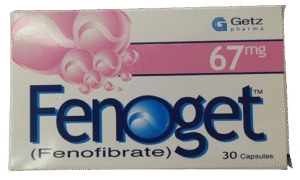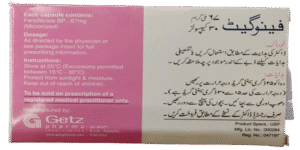Fenoget
Fenoget (Fenofibrate) Getz Pharma 67mg Capsules. It contains fenofibrate, a medicine that helps lower cholesterol and triglycerides (fats) in the blood. It belongs to a group of drugs called fibric acid derivatives.
Mechanism of Action (How it works): Fenofibrate activates a protein in the body called PPAR-α (Peroxisome Proliferator Activated Receptor alpha). This helps:
- Break down and remove triglyceride-rich fats from the blood.
- Lower “bad” cholesterol (VLDL and LDL).
- Increase “good” cholesterol (HDL).
- It also improves the body’s ability to clear harmful small LDL particles, which reduces the risk of heart disease.
Package Contains: Each packet of Fenoget contains 30 Capsules of 67mg & a leaflet. It is also available as Fenoget 10 capsules box of 200mg each. 
Composition: Each capsule contains:
Fenofibrate BP 67mg.
(Micronized)
Product Specs: USP
Dosage: As directed by the physician or see package insert for full prescribing information.
Therapeutic Indications / Uses: Primary Hypercholesterolemia and Mixed Dyslipidemia: It is indicated as adjunctive therapy to diet to reduce elevated low-density lipoprotein cholesterol (LDL-C), total cholesterol (Total-C), triglycerides (TG), and apolipoprotein B (Apo B), and to increase high-density lipoprotein cholesterol (HDL-C) in adult patients with primary hyperlipidemia or mixed dyslipidemia.
Hypertriglyceridemia: It is also indicated as adjunctive therapy to diet for the treatment of adult patients with hypertriglyceridemia.
Dosage & Administration: Patients should be placed on an appropriate lipid-lowering diet before receiving the capsules and should continue on this diet during treatment. The capsules should be given with meals, thereby optimizing the bioavailability of the medication.
Primary Hypercholesterolemia or Mixed Dyslipidemia: For the treatment of adult patients with primary hypercholesterolemia or mixed hyperlipidemia, the initial dose of Fenoget capsules is 200mg per day.
Hypertriglyceridemia: For adult patients with hypertriglyceridemia, the initial dose is 67mg to 200mg per day. Dosage should be individualized according to patient response, and should be adjusted if necessary following repeat lipid determinations at 4 to 8 week intervals. The maximum dose is 200mg per day.
Special Population:
Renal Impairment: Treatment with Fenoget should be initiated at a dose of 67mg/day in patients with impaired renal function, and increased only after evaluation of the effects on renal function and lipid levels at this dose.
Elderly: In the elderly, the initial dose of Fenoget should likewise be limited to 67mg/day.
Lipid levels should be monitored periodically, and consideration should be given to reducing the dosage of Fenoget (Fenofibrate) if lipid levels fall significantly below the targeted range.
Contraindications: Fenofibrate is contraindicated in patients:
- With hypersensitivity to fenofibrate or any component of the product.
- With severe renal dysfunction.
- With hepatic dysfunction, including primary biliary cirrhosis and unexplained persistent liver function abnormality.
- With pre-existing gall bladder disease.
- With chronic or acute pancreatitis with the exception of acute pancreatitis due to severe hypertriglyceridemia.
Pregnancy & Lactation: Fenofibrate should be used during pregnancy only if the potential benefit justifies the potential risk. It should not be used in nursing mothers.
Adverse Effects: The side effects of Fenoget capsules are in the following three categories:
Common: Abdominal pain, nausea, vomiting, diarrhea, flatulence, and transaminases increased.
Uncommon: Headache, pulmonary embolism, deep vein thrombosis, pancreatitis, cholelithiasis, cutaneous hypersensitivity (e.g., rashes, pruritus, urticaria), and muscle disorder (e.g., myalgia, myositis, muscular spasms and weakness).
Rare: Hemoglobin decreased, white blood cell count decreased, hypersensitivity, hepatitis, alopecia, and photosensitivity reactions.
Precautions:
Initial Therapy: Laboratory studies should be done to ascertain that the lipid levels are consistently abnormal before instituting therapy with fenofibrate. Every attempt should be made to control serum lipids with an appropriate diet, exercise, weight loss in obese patients, and control of any medical problems, such as diabetes mellitus and hypothyroidism, that are contributing to the lipid abnormalities.
Continued Therapy: Periodic determination of serum lipids should be obtained to determine the lowest effective dose of fenofibrate. Therapy should be withdrawn in patients who do not have an adequate response after two months of treatment with the maximum recommended dose.
Fenofibrate therapy is not indicated for patients with Type 1 Hyperlipoproteinemia, who have elevations of chylomicrons and plasma triglycerides, but who have normal levels of very low-density lipoprotein (VLDL).
Regular periodic monitoring of liver function, including serum ALT (SGPT), should be performed for the duration of therapy with fenofibrate, and therapy should be discontinued if enzyme levels persist above three times the normal limit.
Fenofibrate, like clofibrate and gemfibrozil, may increase cholesterol excretion into the bile, leading to cholelithiasis. If cholelithiasis is suspected, gall bladder studies are indicated, and fenofibrate therapy should be discontinued if gallstones are found.
Periodic blood counts are recommended during the first 12 months of fenofibrate administration.
Patients receiving fenofibrate and complaining of muscle pain, tenderness, or weakness should have prompt medical evaluation for myopathy, including serum creatinine kinase level determination. If myopathy/myositis is suspected or diagnosed, fenofibrate therapy should be stopped.
Drug Interactions: (Fenofibrate):
- Oral Anticoagulants: Fenofibrate may enhance anticoagulant effects; monitor and adjust dose to maintain target INR (International Normalized Ratio), to ensure the blood isn’t too thin (risk of bleeding) or too thick (risk of clotting).
- Statins: Avoid combination unless benefits outweigh the increased risk of myopathy.
- Bile Acid Resins: Take fenofibrate 1 hour before or 4–6 hours after to prevent reduced absorption.
- Cyclosporine: May increase nephrotoxicity risk; monitor renal function and use the lowest effective dose.
- Beta-blockers, Thiazides, Estrogens: Discontinue or replace if possible, as they can worsen hypertriglyceridemia.
- Daptomycin: Concomitant use increases the risk of myopathy.
- Antidiabetics: Fenofibrate may improve glucose tolerance and have an additive effect with insulin or sulphonylureas.
- Colchicine: Risk of myopathy/rhabdomyolysis; consider dose adjustment.

Instructions:
Store at 25°C (Excursions permitted between 15°C-30°C).
Protect from sunlight & moisture. Keep out of reach of children.
To be sold on the prescription of a registered medical practitioner only.
Manufactured & Buy Online:
Fenoget capsules are manufactured by Getz Pharma Pvt LIMITED.
This is the link to the manufacturer: https://getzpharma.com
You can buy this medicine online at: https://healthwire.pk
Or it can be purchased from any nearby pharmacy.